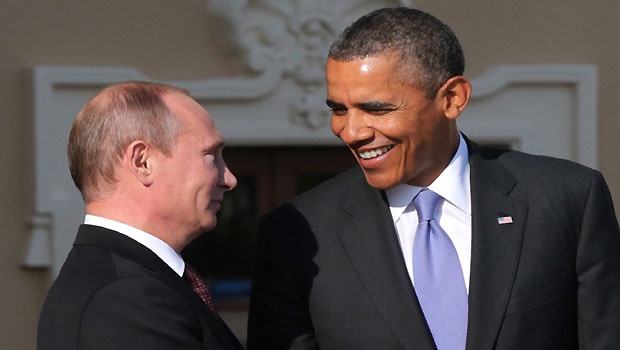In my column on August 30, I wondered whether US President Barack Obama and his Russian counterpart Vladimir Putin were engaged in a danse macabre. I didn’t know that this suspicion would soon be reconfirmed with a new round in that dance around Syria.
Last week it had become clear that Obama was looking for a way out of his Hamlet-like trap after his huffing and puffing about “punishing” Syrian President Bashar Al-Assad for alleged use of chemical weapons.
Obama regretted his bellicose utterances almost as soon as he made them. This is why he surprised everyone by announcing that he would do nothing without a vote in the US Senate and House of Representatives. For a few days he hoped that Congress might get him off the hook by voting “no”. Last Saturday, however, there were signs that he might secure a narrow majority for what US Secretary of State John Kerry described as an “unbelievably small” attack.
It was then that Obama’s partner in this danse macabre, Putin, rushed to the rescue by flying an unbelievable kite regarding “international control” over Assad’s chemical weapons—weapons that the Syrian insists he does not have.
Overjoyed that he was no longer required to act, Obama returned to his favorite sport of making speeches, often on TV, and announced that the Congressional vote was postponed “indefinitely”, and the “unbelievably small” attack was on hold.
For years, Putin has helped get Obama off the hook by playing “bad guy” to his “good guy” image.
But why should Putin be keen to save Obama from the consequences of his incompetence?
The answer is that, as far as Moscow is concerned, Obama is the best news from Washington since Jimmy Carter.
Carter is the one-term president who gave the now defunct Soviet Union four full years in which to project global power.
In those years, Moscow pushed Iran’s Communists into coalition with mullahs under Rouhollah Khomeini to topple the Shah. Then, Moscow used Khomeini to flush out the 23,000 American advisors working for the Shah’s air force. Khomeini also dismantled the 32 “listening stations” set up by the United Nations under an international treaty to monitor Soviet missile tests. Next, came the demonstration of American helplessness as Khomeinist and Communist “students” raided the US Embassy in Tehran and held its diplomats hostage for 444 days.
That was not all.
Moscow ordered the assassination of Afghanistan’s President Hafizullah Amin and replaced him with a KGB man, Babrak Karmal. When the Afghans revolted, Moscow sent the Red Army to crush them.
In the Horn of Africa, the pro-Moscow Mengistu Haile Mariam seized power as Carter started his presidency. In the four years that followed, the USSR established itself as the key power in Africa.
In Europe, the USSR dotted the territory of Warsaw Pact partners with SS-20 missiles, upsetting the Cold War balance of power.
Carter reacted to the Soviet expansionist frenzy by boycotting the Moscow Olympics, a move that allowed Russians to win even more gold medals.
Well, that was then, you might say, what has Obama done to please Putin?
The answer is: plenty. Here are some examples:
– In August 2008, Russia invaded Georgia and occupied 25 percent of its territory. The Security Council was supposed to act in a session in February 2009. That never happened. Just-sworn-in-as-president Obama simply brushed the matter under the carpet. Since then, Russia has effectively annexed South Ossetia and Abkhazia and is busy turning what is left of Georgia into a satellite state.
– Putin has pressured Central Asian republics, notably Tajikistan and Kyrgyzstan, back into the old Soviet fold, pushing Americans out and forcing the closure of US logistics bases.
– The pro-West government in Ukraine has been toppled and its leader imprisoned. Its place has been taken by men looking to Moscow not Washington.
– Putin “persuaded” Obama to scrap a missile-defense shield that President George W. Bush planned to build in Central and Eastern Europe.
– Putin has strengthened anti-US alliances that include Iran and Syria, and, in a different context, China and the Central Asian republics. Before Obama became president, Moscow’s arms exports to Latin America were limited to one country: Cuba. By 2013, the number had grown to 14.
– With Obama’s cooperation, Putin has fudged Iran’s nuclear ambitions. Five resolutions of the Security Council have been put on hold in exchange for sporadic “talks about talks”. When Obama became president, Iran had 100 kilograms of uranium enriched to 3.5 percent. Today, it has 3,000 kilograms, partly enriched to 20 percent. Before Obama, Iran had 800 working centrifuges; now it has 12,000.
– Obama dropped US objections that, despite 18 years of negotiations, prevented Russia from joining the World Trade Organization (WTO), giving Putin an easy ride and a big diplomatic victory.
– Started under Bush, the redesigning of the North Atlantic Treaty Organization (NATO) and its extension to new members and/or partners in Europe, Transcaucasia and Central Asia has been put on hold. Cooperation agreements with six Arab countries have also been de-activated.
The Obama-Putin partnership may suit both leaders, however, three points merit attention:
The first is that the double act does not necessarily suit the interests of either the US or Russia.
The second is that while Obama and Putin do their double act, the carnage in Syria continues. The danger of Syria becoming a Somalia on the Mediterranean should not be dismissed.
Finally, Putin would do well to re-read history. Carter was good for the Soviet Union for four years. But Carter paved the way for Ronald Reagan and the fall of the Soviet Empire.
